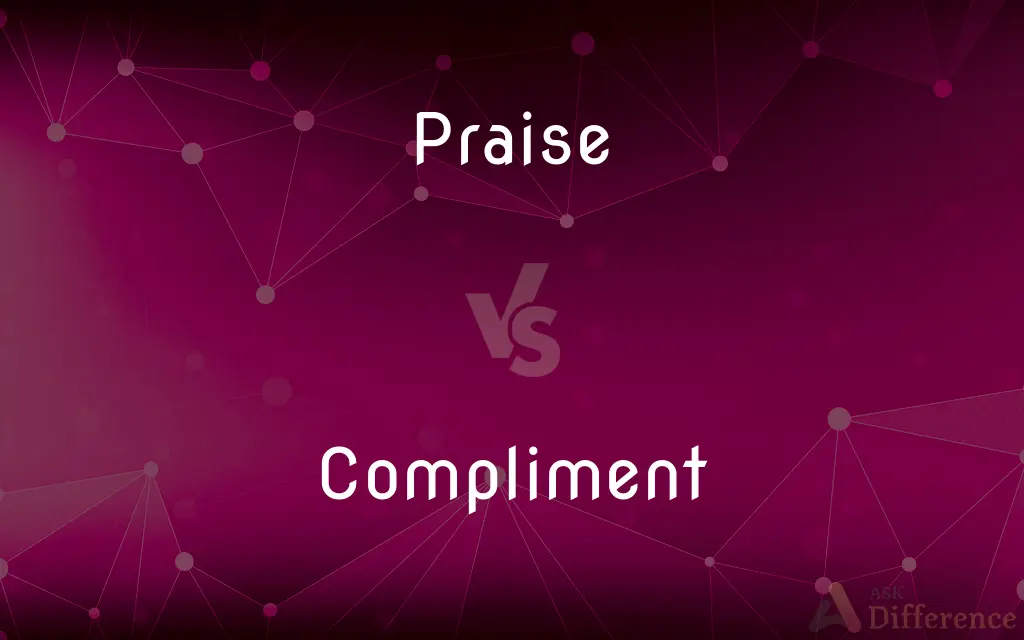Praise vs. Compliment — What's the Difference?
By Tayyaba Rehman & Fiza Rafique — Published on October 5, 2023
Praise is expressing approval or admiration for someone's qualities or deeds; compliment is a polite expression of admiration or flattery.

Difference Between Praise and Compliment
Table of Contents
ADVERTISEMENT
Key Differences
Praise and compliment are both positive affirmations, but they serve distinct purposes. Praise is broader, often focusing on abilities, qualities, or achievements. It can be given in a more general context, such as praising someone's overall character or consistent performance. For example, a teacher might praise a student for their dedication to studies over the semester.
Compliment, on the other hand, is more specific and is usually centered around a particular trait, appearance, or one-time action. Compliments often address things that are outwardly noticeable and can be spontaneous reactions to something immediately observed. A student might receive a compliment for a well-presented project or their choice of attire on a given day.
From a linguistic perspective, praise can be both a noun and a verb, allowing it to fit seamlessly into various sentence structures. Compliment, too, functions as both a noun and a verb, but its usage might be more restricted to specific scenarios of polite acknowledgment. In essence, while all compliments can be considered praise, not all praises are compliments.
Culturally, the weight of praise and compliment can vary. Praise might hold deeper significance, often acknowledging intrinsic value or consistent effort. Compliments, though meaningful, might be lighter, addressing fleeting moments or external characteristics. Nonetheless, both contribute positively to human interactions, fostering goodwill and appreciation.
Comparison Chart
Definition
Approval based on qualities or deeds.
Polite expression of admiration or flattery.
ADVERTISEMENT
Focus
Broader: abilities, qualities, or achievements.
Specific: trait, appearance, or one-time action.
Grammatical Use
Functions as both noun and verb.
Also functions as both noun and verb.
Depth
Might hold deeper significance or acknowledgment.
Often lighter, addressing immediate observations.
Context
Can be given in general contexts.
Usually addresses something immediately observed.
Compare with Definitions
Praise
Recognition for one's achievements or qualities.
Her praise for his dedication was heartfelt.
Compliment
A polite expression of admiration.
She received a compliment on her new hairstyle.
Praise
Commendation for performance or character.
His tireless work earned him the praise of his superiors.
Compliment
An appreciative comment regarding appearance or ability.
The singer blushingly accepted the compliment on her voice.
Praise
An expression of approval or admiration.
Parents should offer praise when children exhibit good behavior.
Compliment
An acknowledgment of a positive trait or action.
His boss paid him a compliment for his innovative solution.
Praise
An act of worship or acknowledgment of worth.
They sang hymns in praise of the divine.
Compliment
An expression of praise, admiration, or congratulation.
Praise
Acclaim given for notable accomplishments.
The athlete received high praise for breaking the world record.
Compliment
A formal act of civility, courtesy, or respect.
Praise
Expression of approval, commendation, or admiration.
Compliment
Compliments Good wishes; regards
Extend my compliments to your parents. See Usage Note at complement.
Praise
The extolling or exaltation of a deity, ruler, or hero.
Compliment
To pay a compliment to.
Praise
(Archaic) A reason for praise; merit.
Compliment
To show fondness, regard, or respect for by giving a gift or performing a favor.
Praise
To express warm approval of, commendation for, or admiration for.
Compliment
An expression of praise, congratulation, or respect.
Pay someone a compliment
Praise
To express a feeling of veneration or gratitude to (a deity); worship or glorify.
Compliment
(uncountable) Complimentary language; courtesy, flattery.
Praise
Commendation; favourable representation in words.
The writer's latest novel received great praise in the media.
You deserve praise for the hard work you've done recently.
She gave them some faint praise for their assignments, despite not being totally convinced by the quality.
Dim praise
Compliment
Misspelling of complement
Praise
Worship.
Praise of God
Compliment
(ambitransitive) To pay a compliment (to someone); to express a favourable opinion (of someone).
Praise
To give praise to; to commend, glorify, or worship.
Be sure to praise Bobby for his excellent work at school this week.
Some of the passengers were heard praising God as the stricken plane landed safely.
Compliment
Misspelling of complement
Praise
To commend; to applaud; to express approbation of; to laud; - applied to a person or his acts.
Let her own works praise her in the gates.
We praise not Hector, though his name, we know,Is great in arms; 't is hard to praise a foe.
Compliment
An expression, by word or act, of approbation, regard, confidence, civility, or admiration; a flattering speech or attention; a ceremonious greeting; as, to send one's compliments to a friend.
Tedious waste of time, to sit and hearSo many hollow compliments and lies.
Many a compliment politely penned.
Praise
To extol in words or song; to magnify; to glorify on account of perfections or excellent works; to do honor to; to display the excellence of; - applied especially to the Divine Being.
Praise ye him, all his angels; praise ye him, all his hosts!
Compliment
To praise, flatter, or gratify, by expressions of approbation, respect, or congratulation; to make or pay a compliment to.
Monarchs should their inward soul disguise; . . . Should compliment their foes and shun their friends.
Praise
To value; to appraise.
Compliment
To pass compliments; to use conventional expressions of respect.
I make the interlocutors, upon occasion, compliment with one another.
Praise
Commendation for worth; approval expressed; honor rendered because of excellence or worth; laudation; approbation.
There are men who always confound the praise of goodness with the practice.
Compliment
A remark (or act) expressing praise and admiration
Praise
Especially, the joyful tribute of gratitude or homage rendered to the Divine Being; the act of glorifying or extolling the Creator; worship, particularly worship by song, distinction from prayer and other acts of worship; as, a service of praise.
Compliment
Say something to someone that expresses praise;
He complimented her on her last physics paper
Praise
The object, ground, or reason of praise.
He is thy praise, and he is thy God.
Compliment
Express respect or esteem for
Praise
An expression of approval and commendation;
He always appreciated praise for his work
Compliment
A remark that flatters or pleases.
Your dress is beautiful! is a common compliment.
Praise
Offering words of homage as an act of worship;
They sang a hymn of praise to God
Compliment
Recognition of something done well.
The chef took the compliment about the dessert to heart.
Praise
Express approval of;
The parents praised their children for their academic performance
Common Curiosities
Are praise and compliment interchangeable?
Not always. While all compliments can be praises, not all praises are compliments.
Can a compliment be insincere?
Yes, sometimes compliments can be given out of politeness and may not be genuine.
Can I compliment someone's inherent qualities?
Typically, compliments are about specific traits or actions, while praise might address inherent qualities.
Is praise deeper than a compliment?
Praise might hold deeper significance, acknowledging effort or value, whereas compliments might be lighter.
What's the opposite of a compliment?
An insult or criticism is typically the opposite of a compliment.
Why is it important to praise?
Praise recognizes effort and achievements, boosting morale and motivation.
Can businesses also receive compliments?
Yes, businesses often receive compliments for their products, services, or customer interactions.
Are there cultural differences in giving praise or compliments?
Yes, how and when to give praise or compliments can vary across cultures.
Is praising children always good?
While praise can boost confidence, it's essential that it's genuine and specific to be effective.
Can praise be public or private?
Praise can be given both publicly, like in award ceremonies, or privately in one-on-one scenarios.
Should compliments always be about appearance?
No, compliments can address any positive observation, be it about appearance, actions, or abilities.
Can too much praise be harmful?
Excessive or insincere praise might lead to overconfidence or a lack of motivation to improve.
How should I respond to praise or a compliment?
A simple "thank you" is generally a good response.
What's the best way to compliment someone I don't know well?
Keep it sincere, specific, and related to an immediate observation or interaction.
Is it good to compliment competitors in business?
While it shows sportsmanship, ensure compliments are genuine and not perceived as disingenuous.
Share Your Discovery

Previous Comparison
Monetary Assets vs. Non Monetary Assets
Next Comparison
Ensnared vs. LureAuthor Spotlight
Written by
Tayyaba RehmanTayyaba Rehman is a distinguished writer, currently serving as a primary contributor to askdifference.com. As a researcher in semantics and etymology, Tayyaba's passion for the complexity of languages and their distinctions has found a perfect home on the platform. Tayyaba delves into the intricacies of language, distinguishing between commonly confused words and phrases, thereby providing clarity for readers worldwide.
Co-written by
Fiza RafiqueFiza Rafique is a skilled content writer at AskDifference.com, where she meticulously refines and enhances written pieces. Drawing from her vast editorial expertise, Fiza ensures clarity, accuracy, and precision in every article. Passionate about language, she continually seeks to elevate the quality of content for readers worldwide.
















































